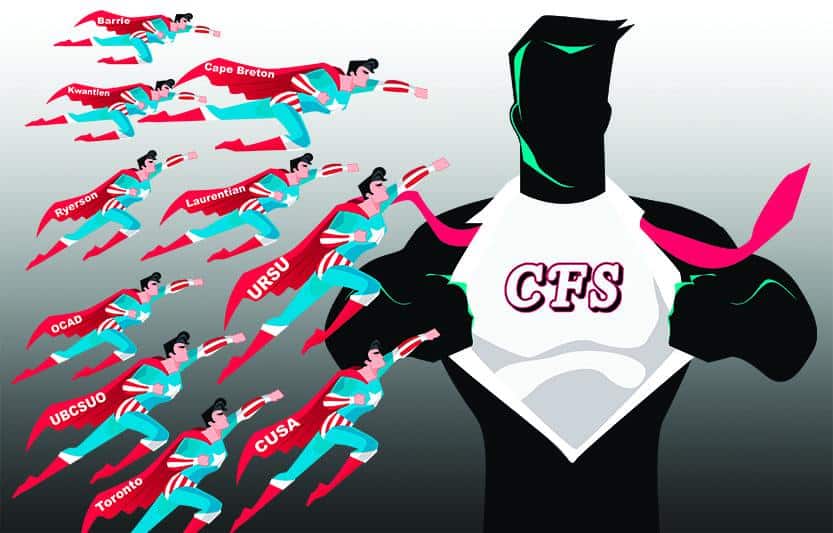URSU part of CFS reform request

author: john loepkky | sports editor

springing into action credit freepik
Student’s unions contend federation in need of change
A recently released press release puts the University of Regina and their students at odds with the Canadian Federation of Students (CFS).
They aren’t alone. Other unions, representing students from nine other institutions, are asking the CFS for reform. Those other unions include: CUSA (Carleton University Students’ Association), UBCSUO (University of British Columbia Students’ Union-Okanogan), our own URSU, Ryerson Students’ Union, OCAD (Ontario College or Art and Design Student Union), Kwantlen Student Association, Laurentian University Students’ General Association, Cape Breton University Students’ Union, University of Toronto Students’ Union, and Laurentian University at Barrie Students’ Union.
All ten unions are calling for a number of reforms that have to do with a myriad of topics. Chief among their concerns is that they feel that the CFS and its work is mostly staff-driven when it should be student-driven. URSU VP of Student Affairs, Shawn Wiskar, says that the University of Regina’s chief complaint is that our university doesn’t feel many of the benefits of membership because of our location on the prairies.
“It’s [the federation’s contributions] not really working effectively here in Saskatchewan. We find that they don’t really do a lot for us. We pay fees and then we don’t really see what happens to those fees.”
At the same time, Wiskar does acknowledge the “Fight The Fees” campaign that the CFS has been promoting on campus. This will lead to a so-called “Day of Action” on Nov. 2 that will involve a march on the legislature.
The concerns brought forward by the ten student unions are, in short, the following: that the CFS does not keep proper minutes at their meetings and does not provide them online; a trend towards the voice of staff rather than students, a “lack of space for dissent and for constructive criticism.” The hardships faced to obtain relevant information, the inherent challenges and difficulty around leaving the Federation and the “closed, exclusive nature of general meetings.” Wiskar says that these issues are noticeable to those in attendance at CFS meetings.
“We find, especially when you go to the CFS meetings, there is a lot of dissent and there’s not really room for constructive criticism of the CFS itself. It’s very run by the staff.”
The issues surrounding the difficult decision to leave the CFS is especially forefront in the minds of those attempting these reforms because of a lawsuit put forward by the Federation after the Cape Breton University Students’ Union that forced the group to contemplate bankruptcy proceedings. Wiskar says that the end goal for the University of Regina is not to leave the CFS.
“In the past, URSU has had talks of leaving the CFS, even have had their own referendum on campus. The last thing we really want to do is leave the CFS because we see the benefits of the services that they advocate for, but really we think that it needs to be delivered in a better way.”
The VP of Student Affairs does acknowledge, however, that a rejection of these reforms could lead to significant actions being taken by URSU.
“If these reforms were to be shut down, I think we would have to enter some serious talks about leaving, but that’s really not what we are interested in at the moment.”
The process by which URSU came to be involved with these proposed changes, Wiskar says, was because of face-to-face meetings and a direct invite from one of the other schools.
“It kind of started at CFS [their general meetings] in June when we arrived. We got there and we were kind of skeptical of the CFS. It came about through general discussions with a couple of other student unions at CFS and then after leaving we were approached by Ryerson University to join this campaign, to push for reform.”
The disconnect that URSU feels between members of our campus and the CFS is most keenly felt in the services that are not currently provided to our students, but that are advocated for. Wiskar has a number of services that he hopes can be provided to students.
“The CFS pushes a lot for ethical purchasing and they have this thing called the International Student Identity Card, which promises you different discounts all over the country. However, in the prairies, there are virtually no discounts available to students. I would really like to see an expansion of that service.”
Another push that Wiskar wants to see has to do with advocacy on behalf of students when it comes to tuition.
“Advocating to the government about the rising prices of tuition. We are seeing our first campaign in probably six years on our campus advocating for lower tuition. Really, we’ve made no strides. Since I started university, my tuition has gone up every year and it has continued to go up since the tuition freeze ended. It is projected to keep going up four per cent every year until 2018 or 2019.”
The real issue, he contends, is how hard it is for students to be able to pay for school while attending and not sacrificing their studies in the process.
“We need to find a way for these students to be able to have their voice heard on the campus because I know there are a lot of students out there that are struggling to be able to afford living, and tuition, and many of them are forced to take two or three part-time jobs and that is not really fair. It takes away from the value of your education when you spend the time you could be studying, instead, working.”
The Carillon will continue to update the campus community as the fallout is felt from these proposed reforms.









